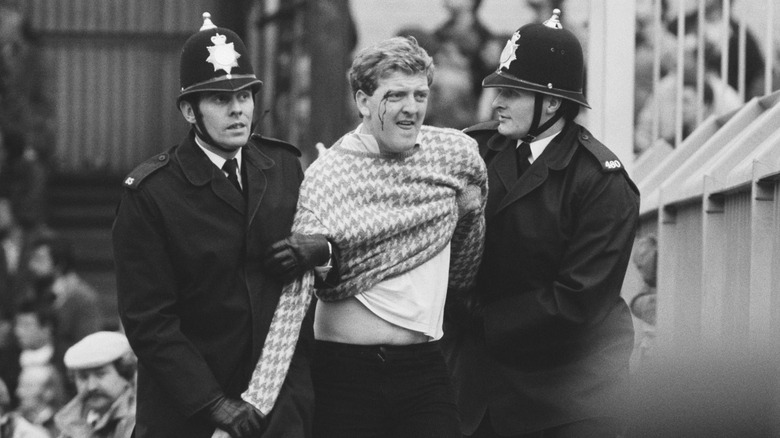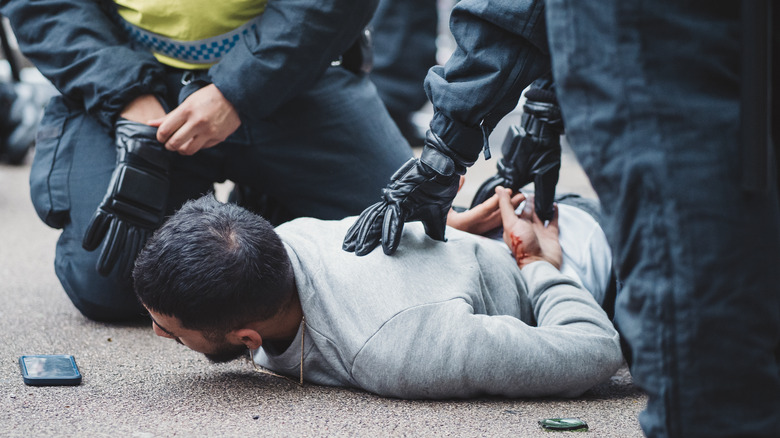What Really Happens When You're Banned From A Sports Stadium For Life
Do you ever find yourself wondering what happens to a streaker once he or she is tackled to the ground following a daring sprint onto the field? What happens if an intoxicated hooligan tries to cause trouble and has to be removed from the area by security guards? A lifetime ban from a stadium turns out to be far more complicated to implement than one might think.
It takes a lot of work to get banned from a stadium. You'd have to severely aggravate the stadium's authorities by being in a brawl, ticket scalping, or running onto the field. Fans who cause a disturbance are typically removed to a separate area and asked to sign a contract agreeing to a ban before being banished. For use in court in the event of a breach of contract or as a public confession of guilt, some stadiums even take a picture of the offending fan holding the contract (via Washington Post).
Security personnel may have photographs of banned fans on file in the event that they try to re-enter the stadium. However, does this alone work as a deterrent? As a sports stadium security consultant named William D. Squires told CNN, "If someone is stupid enough to get thrown out of a stadium, they are stupid enough to try to get back in."
So, how effective are these lifelong bans, and how are they enforced? Is the risk of getting caught again really so high?
Just Try and Stop Me
Before you attempt to master the art of disguise by donning some glasses and a phony mustache in the hopes of going incognito, you should understand how stadium security works. How probable is it that security staff will know even one individual out of thousands when their job is to scan faces and stop trouble before it starts?
In a separate interview with The Washington Post, William Squires alleges major stadiums, like Yankees Stadium, even deploy moles, or covert security personnel in the bleachers, to catch people attempting to bypass their ban. Another beer-soaked example of this is the ”super-recognizers'' from the Munich police department, which prevented people from entering Oktoberfest in 2018.
If stadiums conduct cross-checks on all credit cards used to purchase tickets, it would theoretically be simple for forbidden fans to have a friend buy tickets for them using one of their credit cards. Although, any friends who bought the ticket may be in hot water with the stadiums too (per The Washington Post).
On a more advanced, rather dystopian level, face-recognition technology may conceivably be utilized in the future to ensnare bold supporters undeterred by lifetime bans. As a result, sports stadiums could follow in the same depressing footsteps of airports, casinos, and Taylor Swift concerts. While stadium security experts say it's still a few years away from being implemented, sports stadiums could essentially become a panopticon with a playing pitch (per The Washington Post).
So, suppose you bamboozled the guards, had a friend buy you a ticket and a pretzel, yet still got caught before the final whistle. What's the worst that could happen?
You Got Caught. Now What?
Surprisingly, each sports league and stadium has its own set of rules for what happens afterward. According to The Washington Post, if sports fans are removed and banned from one NFL stadium, they're also barred from other NFL stadiums. Stadiums in Major League Baseball, on the other hand, regularly issue multi-year bans.
Across the pond in the English Premier League, the penalties for a stadium ban can be even more heavy-handed. Invading the pitch, being disruptively drunk, and attempting to enter a stadium with a flare or firework is not punishable by imprisonment. Fans, on the other hand, may be issued an F.B.O. (Football Banning Order), which, if violated, can result in a nasty six-month prison sentence (per Goal).
In extreme instances, these F.B.O.s might last up to ten years and have far-reaching consequences. Offenders are not allowed to enter any football stadium in the United Kingdom, and are not permitted to attend any national team matches, even those played abroad. Fans may even be requested to report to a police station or to hand over their passports in such circumstances (via Goal).
Even if a banned fan behaves correctly the next time they visit, they may face trespassing charges (via CNN). So, if you're a repeat offender, the most likely outcome for your repeated mischief is a hefty fine or legal action. So stay out of trouble if you don't want to find out. After all, if you can't handle the time, don't do the crime!


